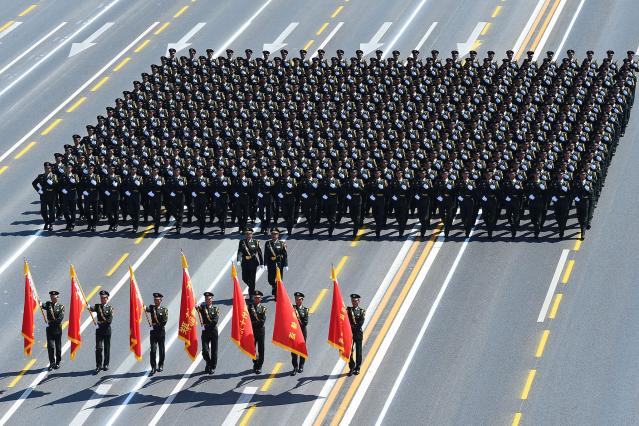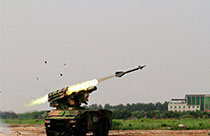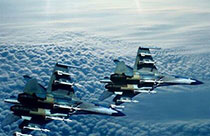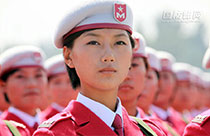


While the beauty of the season's colors inspired wonderment at Mother Nature's palette and elicited sighs over the transience of such beauty, Thursday's Victory Day commemorations in Beijing provoked dramatically different sentiments.
In the standard Western portrayals, it was China flexing its newly gained military muscles.
To some across the Pacific, as well as immediately next-door, it was proof of China's "increasing assertiveness"; even an attempt to intimidate.
That was why some present-day leaders of the Allied countries in World War II chose to be absent, and why Japan as a country was unrepresented.
Unlike Germany whose leaders attended V-Day events in France repeatedly, Japan even went out of its way to admonish the United Nations secretary-general for attending the commemorations in Beijing, urging him to remain "neutral".
To the host country and its people, however, it was nothing but an occasion to reflect on the past and reiterate their commitment to peace.
The victory parade was no doubt the visual highlight of the commemorations. And that was unpleasant to some eyes.
But it was a memorial event; and on such occasions a military review is normal and appropriate. Many countries have celebrated such anniversaries with a military parade. China, an unmistakable leading character in the Far East theater of WWII, had more reasons than most to do so.
Sure, the People's Liberation Army unveiled a couple of new makings some outsiders found "threatening", including the well-gossiped about DF-21D missiles. And the way the phalanges were formed offered clues to changes in the strategic thinking and tactics of the PLA. These just boil down to updated combat capabilities.
And like all military developments, they are in no way intimidating in the right hands.

To those suspicious of China's orientation, President Xi Jinping made a solemn vow: "China will never seek hegemony, China will never seek to expand, and will never inflict the tragedies it suffered in the past upon others." He substantiated that promise with the announcement that the PLA was to cut 300,000 troops.
Aggression and overseas expansion have never been a part of the Chinese cultural DNA. Even the Chinese military classic Art of War deems the use of force as the very last resort.
"Do not attack until attacked." That is a sacred ancient teaching enshrined and faithfully observed by present-day China.
For the organizers and the home audience, the commemorative parade was not about military muscle. For them, the core messages were quite the opposite.
They wanted this to be a loud reminder: of the ferocity of the war and the sacrifices the nation made; of the country's role, as what Oxford University scholar Rana Mitter has called the "forgotten ally" in the world's war against fascism; of the contributions of foreign friends and allies; and, more importantly, of the country's commitment to peace and its capability to preserve it.
The presence of representatives of the American Volunteer Group, known as the "Flying Tigers", as well as the air squadron from the then Soviet Union, and relatives of such outstanding foreign nationals as Norman Bethune, was symbolic of Chinese gratitude to all who lent a helping hand when the nation was in danger.
To many in the Chinese audience, at home and abroad, this was the real highlight of the commemorations, the unprecedented show of homage to the heroes and heroines in that nation-saving brutal war. The cheers and tears as the phalanx of war veterans led the victory parade effectively made this parade more special and complete than previous ones.
The fact that veterans of both the Communist Party of China and Kuomintang forces were officially represented, and stood shoulder to shoulder, at the commemoration was a historical, and historic, first that hinted at an evolving approach to the two parties' shared past.
Despite diverging narratives of that period in the country's history, they share a historical obligation to work for ultimate reconciliation at home and to heal the wounds of the civil war.

In a broader context, as was evident in the diplomatic wrangling before the commemorations, the road toward reconciliation remains long and tortuous in East Asia.
In an impressive joint overture on Wednesday, Chinese Premier Li Keqiang and President Park Geun-hye of the Republic of Korea expressed common interest in seeking cooperation with Japan. That was a precious gesture of the two victim countries' magnanimity considering the insincerity of Japanese Prime Minister Shinzo Abe's recent speech about the war.
That message also tests Abe's claim that he wants to improve relations with Japan's two neighbors, because an insurmountable obstacle to reconciliation is his administration's attitude toward WWII.
 'Enemy planes' intercepted by Hongqi-7B air-defense missiles
'Enemy planes' intercepted by Hongqi-7B air-defense missiles Blind date with bikini girls in Nanjing
Blind date with bikini girls in Nanjing Amazing photos of Chinese fighter jets
Amazing photos of Chinese fighter jets Chinese soldiers participate in training for V-Day parade
Chinese soldiers participate in training for V-Day parade Painting: Lonely women in Forbidden City
Painting: Lonely women in Forbidden City China and Russia hold joint drill in Sea of Japan
China and Russia hold joint drill in Sea of Japan 'Goddess' in Taiwan McDonald's
'Goddess' in Taiwan McDonald's Female soldiers at military parades
Female soldiers at military parades Photos of campus belle doing splits go viral
Photos of campus belle doing splits go viral Best blade forward
Best blade forward Infographic: Parsing China's massive V-day parade
Infographic: Parsing China's massive V-day parade Giant panda cub receives medical care in Guangzhou
Giant panda cub receives medical care in Guangzhou China celebrates 70th Anniversary of Victory of World Anti-Fascist War
China celebrates 70th Anniversary of Victory of World Anti-Fascist WarDay|Week